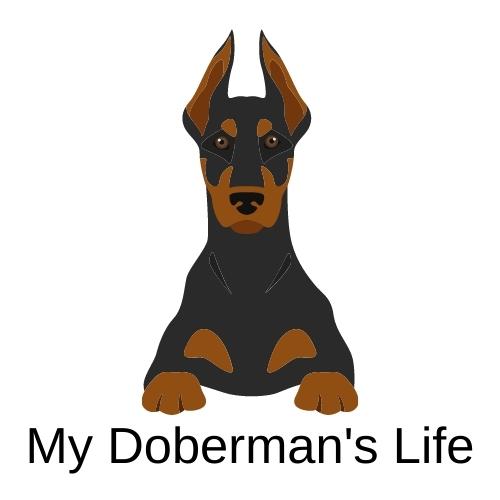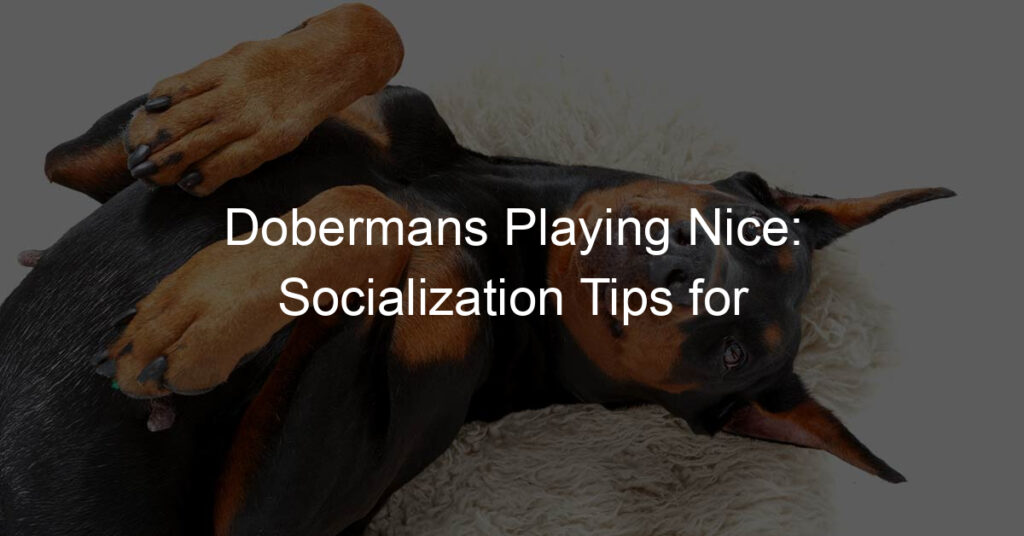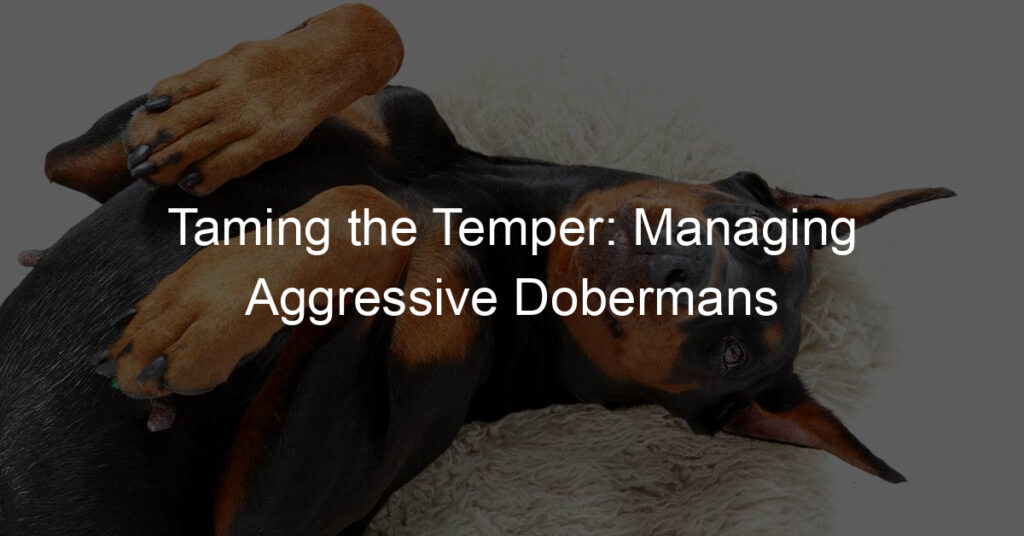
Introduction to Doberman Puppy Socialization
Welcoming a Doberman puppy into your home is a joyous occasion. However, it’s essential to understand the importance of socialization during their early growth stages. This blog post will guide you through the importance of socialization, understanding Doberman puppy behavior, and the benefits of human interaction with your Doberman puppy.
- Importance of Socialization for Doberman Puppies
- Understanding Doberman Puppy Behavior
- Benefits of Doberman Puppy and Human Interaction
Socialization is a critical aspect of a Doberman puppy’s development. It helps them become well-adjusted adults. During the first few months of their life, puppies are very receptive to new experiences. This is the perfect time to expose them to different environments, people, and animals. Proper socialization can help prevent behavioral problems in the future, such as aggression or fearfulness.
Doberman puppies are known for their intelligence and energy. They are curious and eager to explore their surroundings. Understanding their behavior is key to successful socialization. For instance, if your puppy is showing signs of fear or aggression, it might be a sign that they are feeling overwhelmed and need a break from socialization efforts. On the other hand, a happy, wagging tail and playful behavior usually indicate that your puppy is comfortable and enjoying their socialization experience.
Human interaction plays a significant role in a Doberman puppy’s socialization process. Regular interaction with humans can help your puppy develop trust and form a strong bond with you. It also helps them get used to being handled, which can be beneficial during vet visits or grooming sessions. Furthermore, positive human interaction can help your puppy learn to behave appropriately around people, reducing the risk of future behavioral issues.
In conclusion, socialization is an essential part of a Doberman puppy’s development. It helps them grow into well-adjusted, sociable adults. Understanding your puppy’s behavior can help you tailor their socialization experiences to their needs, and regular human interaction can help them develop trust and learn to behave appropriately around people.
Training Doberman Puppies for Socialization
Training your Doberman puppy for socialization is a crucial step in their development. It helps them interact positively with people and other animals. Here are some basic training tips to get you started:
Basic Doberman Puppy Training Tips
-
Establishing a Routine
Doberman puppies thrive on routine. Feed, walk, and play with them at the same times each day. This consistency helps them feel secure and understand what is expected of them. For example, if you walk your puppy every morning at 8 am, they will learn to expect and look forward to this activity.
-
Positive Reinforcement Techniques
Positive reinforcement is a powerful tool for training Doberman puppies. Reward your puppy with treats, praise, or playtime whenever they display good behavior. This encourages them to repeat these behaviors in the future. For instance, if your puppy sits when asked, give them a treat and praise them enthusiastically.
-
Building Confidence in Doberman Puppies
Confidence is key for a well-socialized Doberman. Expose your puppy to a variety of experiences, people, and environments in a safe and controlled manner. This will help them become comfortable in different situations. For example, take your puppy to a park where they can observe and interact with other dogs and people.
Remember, patience and consistency are crucial when training your Doberman puppy. Keep training sessions short and fun, and always end on a positive note. With time and practice, your Doberman puppy will become a well-socialized and confident dog.
Advanced Training Techniques
Training your Doberman puppy for socialization involves more than just basic techniques. Advanced training techniques are equally important to ensure your puppy grows into a well-behaved, sociable adult dog. Let’s explore these techniques in detail.
- Introducing New Experiences
- Handling and Touch Exercises
- Training for Calm Behavior in Public Places
Exposing your Doberman puppy to new experiences is crucial for their development. This could include different environments, people, and other animals. The more experiences your puppy has, the more adaptable they will be. For example, take your puppy to a park, a busy street, or a friend’s house. Each new experience will help your puppy learn how to behave in different situations.
Handling and touch exercises are essential for your Doberman puppy’s socialization. These exercises help your puppy get used to being touched in various places, such as their ears, paws, and mouth. Start by gently touching your puppy in these areas for a few seconds at a time. Gradually increase the duration as your puppy gets more comfortable. Remember, always reward your puppy with treats or praise to make these exercises a positive experience.
Teaching your Doberman puppy to behave calmly in public places is a vital part of their socialization training. Start by taking your puppy to quiet public places and gradually move to busier areas as they get more comfortable. Use treats and praise to reward your puppy for calm behavior. Over time, your puppy will learn to remain calm and composed even in busy, noisy environments.
In conclusion, advanced training techniques play a crucial role in your Doberman puppy’s socialization. Introducing new experiences, handling and touch exercises, and training for calm behavior in public places are all essential for your puppy’s development. Remember, patience and consistency are key in this process. Happy training!
Doberman Puppy Interaction with Different Age Groups
One of the most important aspects of raising a Doberman puppy is understanding how they interact with different age groups. This includes children, adults, and the elderly. In this section, we will focus on how to socialize your Doberman puppy with kids.
Socializing Doberman with Kids
Children and puppies can form a strong bond that lasts a lifetime. However, it’s essential to teach both parties how to interact safely and respectfully with each other. Here are some steps to follow:
- Teaching Kids How to Interact with Puppies
- Supervised Play Sessions
- Training Your Puppy to Be Gentle with Kids
Begin by teaching your children the correct way to approach and handle a puppy. Explain that puppies are not toys and must be treated with care. Teach them to pet the puppy gently, avoid pulling on its ears or tail, and never disturb it while it’s eating or sleeping.
Always supervise play sessions between your child and the Doberman puppy. This ensures that neither the child nor the puppy gets too rough or scared. It’s also a great opportunity to reinforce good behavior and correct any inappropriate actions.
Train your Doberman puppy to be gentle with kids from an early age. Use positive reinforcement techniques such as treats and praise to reward calm and gentle behavior. If the puppy gets too excited, remove it from the situation until it calms down.
Remember, patience and consistency are key when socializing your Doberman puppy with kids. It may take time, but the end result will be a strong and healthy bond between your child and their new furry friend.
Doberman Puppy with Elderly
Doberman puppies can be a wonderful addition to any family, including those with elderly members. It’s important to introduce your puppy to elderly family members in a way that is safe and comfortable for both. Here’s how:
- Introducing Your Puppy to Elderly Family Members
- Training Your Puppy to Be Calm and Gentle
- Benefits of Puppies for Elderly People
When introducing your Doberman puppy to elderly family members, it’s crucial to do so in a calm and controlled environment. Start with short, supervised visits and gradually increase the time they spend together. Always ensure the elderly person is comfortable and not afraid of the puppy. Remember, patience is key in these introductions.
Training your Doberman puppy to be calm and gentle around the elderly is essential. Start by teaching basic commands like ‘sit’, ‘stay’, and ‘down’. Reward your puppy for calm behavior and discourage jumping or overly excited behavior. Consistent training from a young age will help your puppy understand how to behave around elderly people.
Puppies can provide numerous benefits for elderly people. They can offer companionship, reduce stress and anxiety, and even improve physical health by encouraging light exercise and activity. A study showed that pet owners over the age of 65 make 30% fewer visits to their doctors than those without pets.
| Benefits | Description |
|---|---|
| Companionship | Puppies provide a sense of companionship and emotional support to elderly individuals, reducing feelings of loneliness. |
| Stress Reduction | The presence of a puppy can help lower blood pressure and reduce stress and anxiety levels. |
| Physical Health | Regular walks and playtime with a puppy can increase physical activity and improve overall health. |
In conclusion, with proper introduction and training, a Doberman puppy can be a wonderful companion for elderly individuals, providing numerous physical and emotional benefits.
Developing Social Skills for Doberman Puppies
Developing social skills in Doberman puppies is a crucial step in their growth and development. These skills will help them interact positively with other dogs and people, reducing the likelihood of aggressive behavior and fostering a well-rounded and sociable pet. Let’s explore how you can help your Doberman puppy develop these skills.
- Teaching Your Puppy to Read Social Cues
- Training Your Puppy to Respond Appropriately to Other Dogs
- Building Your Puppy’s Confidence in Social Situations
Doberman puppies, like all dogs, communicate primarily through body language. Teaching your puppy to understand these social cues can prevent misunderstandings and conflicts with other dogs. Start by observing your puppy’s interactions with other dogs. Notice how they react to different postures and vocalizations. Then, guide your puppy’s responses. For example, if another dog growls and your puppy doesn’t back off, gently remove your puppy from the situation and distract them with a toy or treat. Over time, your puppy will learn to recognize these cues and respond appropriately.
Once your Doberman puppy can read social cues, the next step is teaching them how to respond. This involves rewarding good behavior and gently correcting inappropriate responses. For instance, if your puppy plays nicely with another dog, give them a treat or praise. If they become overly aggressive or fearful, distract them and remove them from the situation. Remember, patience and consistency are key in this process.
Confidence is crucial for a Doberman puppy to navigate social situations effectively. You can build your puppy’s confidence by gradually exposing them to a variety of social situations. Start with calm, controlled environments, like playdates with a friend’s dog. Gradually increase the complexity of these situations, such as visiting a dog park during off-peak hours. Always ensure your puppy feels safe and secure. With time, your puppy will gain the confidence to handle a wide range of social situations.
In conclusion, developing social skills in Doberman puppies involves teaching them to read and respond to social cues, and building their confidence in social situations. This process requires patience and consistency, but the result is a well-socialized Doberman that can interact positively with other dogs and people.
Conclusion: The Social Butterfly Doberman Puppy
As we wrap up our discussion on the socialization of Doberman puppies, let’s take a moment to revisit the key points we’ve covered, the importance of continued socialization, and some final thoughts on raising a social butterfly Doberman puppy.
- Recap of Doberman Puppy Socialization Techniques
We’ve explored a variety of effective techniques for socializing your Doberman puppy. These include early exposure to different environments, people, and other animals. We’ve also discussed the importance of positive reinforcement, like treats and praises, to encourage good behavior. Remember, the goal is to make your Doberman puppy comfortable and confident in various social situations.
- Importance of Continued Socialization
Continued socialization is crucial for your Doberman puppy. It’s not a one-time event but a lifelong process. Regular social interactions help your puppy to grow into a well-adjusted, confident, and friendly adult dog. It reduces the chances of fear, aggression, or anxiety in unfamiliar situations. So, keep introducing your puppy to new experiences, people, and environments.
- Final Thoughts on Raising a Social Butterfly Doberman Puppy
Raising a social butterfly Doberman puppy is a rewarding experience. With patience, consistency, and love, your Doberman puppy can grow into a confident and friendly dog, comfortable in any social situation. Remember, every puppy is unique and may take their own time to adapt. So, be patient and enjoy the journey of raising your Doberman puppy.
In conclusion, socialization is a key aspect of raising a Doberman puppy. It’s a continuous process that requires time, patience, and consistency. But the end result is worth it – a confident, friendly, and well-adjusted Doberman that can handle any social situation with ease.
| Key Points | Details |
|---|---|
| Early Exposure | Introduce your puppy to different environments, people, and other animals at an early age. |
| Positive Reinforcement | Use treats and praises to encourage good behavior. |
| Continued Socialization | Keep introducing your puppy to new experiences, people, and environments. |
| Patience and Consistency | Every puppy is unique and may take their own time to adapt. Be patient and consistent. |








